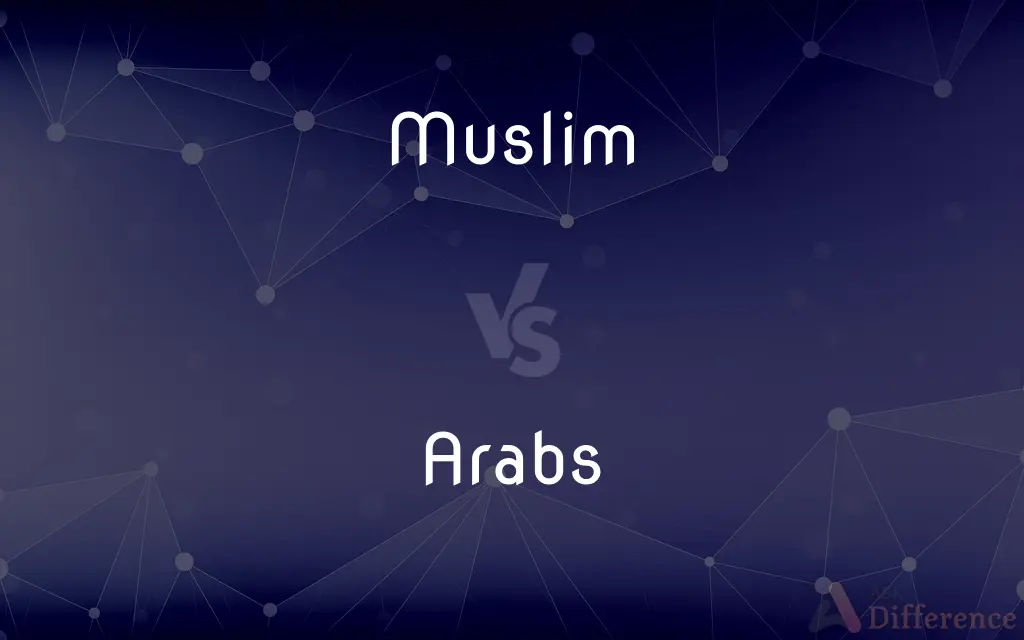Muslim vs. Arabs — What's the Difference?
By Tayyaba Rehman & Maham Liaqat — Published on June 28, 2024
Muslim refers to a follower of Islam, a major world religion, while Arab is an ethnic group primarily from the Arab world. The main distinction lies in religion vs. ethnicity.

Difference Between Muslim and Arabs
Table of Contents
ADVERTISEMENT
Key Differences
Muslims are individuals who practice Islam, a monotheistic religion based on the Quran. Islam's followers adhere to the teachings of Prophet Muhammad, considering him the last prophet sent by God. On the other hand, Arabs are an ethnic group known for their shared language (Arabic) and cultural heritage, predominantly found in the Middle East and North Africa.
While Islam is a major religion in Arab countries, not all Arabs are Muslims; there are Christian, Jewish, and other religious communities within Arab populations. Conversely, the Muslim community is global, with significant populations in South Asia, Indonesia, and beyond, far exceeding the Arab world.
The term Muslim is purely religious, with no implications regarding one's ethnic identity or language. In contrast, Arab identity is closely tied to the Arabic language and cultural practices, irrespective of an individual's religious beliefs.
One common misunderstanding is equating Arab culture with Islamic religious practices. However, Islamic culture is diverse, influenced by local customs and traditions in countries where Islam is practiced, which extends beyond the Arab cultural sphere.
The spread of Islam has led to the adoption of Arabic as a liturgical language among Muslims worldwide, even among non-Arab Muslims who may not speak Arabic as their native language, highlighting the religion's influence beyond ethnic lines.
ADVERTISEMENT
Comparison Chart
Definition
A follower of Islam.
A member of the Arabic-speaking ethnic group.
Basis
Religious belief.
Ethnicity and language.
Global Presence
Worldwide, with major populations in South Asia, Indonesia, and the Middle East.
Concentrated in the Middle East and North Africa.
Language
No specific language; religious texts in Arabic.
Arabic as the primary language.
Diversity
Includes diverse ethnic groups and cultures.
Primarily of one ethnic group, with variations in dialects and customs.
Compare with Definitions
Muslim
One who believes in Allah and Muhammad as His prophet.
Muslims perform five daily prayers.
Arabs
Someone whose native language is Arabic.
Arabic is her mother tongue as she is Arab.
Muslim
A person who practices Islam.
As a Muslim, he fasts during Ramadan.
Arabs
A person from the Arabic-speaking ethnic group.
She is Arab and proud of her heritage.
Muslim
A member of the global Islamic community.
Muslims around the world celebrate Eid.
Arabs
An individual belonging to a culture originating in the Arab world.
Arab poets are renowned for their eloquence.
Muslim
A believer in the pillars of Islam.
As a Muslim, giving to charity is part of his faith.
Arabs
A citizen of an Arab country.
He is an Arab from Egypt.
Muslim
Someone who follows the teachings of the Quran.
The Quran guides her life as a Muslim.
Arabs
A participant in Arab cultural traditions.
As an Arab, family gatherings are important to him.
Muslim
Also Mos·lem (mŏzləm, mŏs-) A believer in or adherent of Islam.
Arabs
A member of a Semitic people inhabiting Arabia, whose language and Islamic religion spread widely throughout the Middle East and northern Africa from the seventh century.
Muslim
A member of the Nation of Islam; a Black Muslim.
Arabs
A member of an Arabic-speaking people.
Muslim
A believer or follower of Islam
Muslim
Of or relating to or supporting Islamism;
Islamic art
Common Curiosities
Are all Muslims Arabs?
No, Muslims come from various ethnic backgrounds worldwide, not limited to Arab ethnicity.
Is Arab a nationality?
Arab is an ethnic identity, not a nationality; Arab people can have various nationalities from countries in the Middle East and North Africa.
What is the main religious text for Muslims?
The Quran is the central religious text for Muslims.
How do Arabs contribute to Islamic culture?
Arabs have contributed significantly through literature, science, and philosophy, particularly during the Islamic Golden Age.
Is it possible to convert to being Arab?
One cannot convert to being Arab as it is an ethnicity, whereas people can convert to Islam.
Can an Arab be non-Muslim?
Yes, there are Christian, Jewish, and other religious communities among Arabs.
What language do Muslims speak?
Muslims speak a variety of languages; Arabic is significant due to its religious texts but not universally spoken by all Muslims.
Do all Arabs practice Islam the same way?
No, there are variations in Islamic practice among Arabs due to different interpretations and cultural influences.
Do Muslims follow any specific cultural practices?
Islamic practices are influenced by the Quran and Hadith, though cultural variations exist across different Muslim communities.
How diverse is the Muslim population?
The Muslim population is highly diverse, including various ethnic groups, cultures, and languages worldwide.
How do Arab and Muslim identities intersect?
While they can intersect, especially in the Arab world where the majority are Muslims, the two identities are distinct, with Arab referring to ethnicity and Muslim referring to religious belief.
Are there Arab communities outside the Arab world?
Yes, there are significant Arab diasporas in Europe, the Americas, and other regions.
What differentiates Arab culture from Islamic culture?
Arab culture is tied to language and ethnicity, while Islamic culture is based on religious practices and beliefs, transcending ethnic lines.
Can Arab culture be found in non-Arab Muslim countries?
Elements of Arab culture, such as language and certain customs, can be found in non-Arab Muslim countries, primarily due to the influence of Islam.
What role does Arabic play in Islam?
Arabic is the language of the Quran and is used in prayers and religious practices by Muslims around the world.
Share Your Discovery

Previous Comparison
Milk vs. Evaporated Milk
Next Comparison
Elect vs. VoteAuthor Spotlight
Written by
Tayyaba RehmanTayyaba Rehman is a distinguished writer, currently serving as a primary contributor to askdifference.com. As a researcher in semantics and etymology, Tayyaba's passion for the complexity of languages and their distinctions has found a perfect home on the platform. Tayyaba delves into the intricacies of language, distinguishing between commonly confused words and phrases, thereby providing clarity for readers worldwide.
Co-written by
Maham Liaqat












































